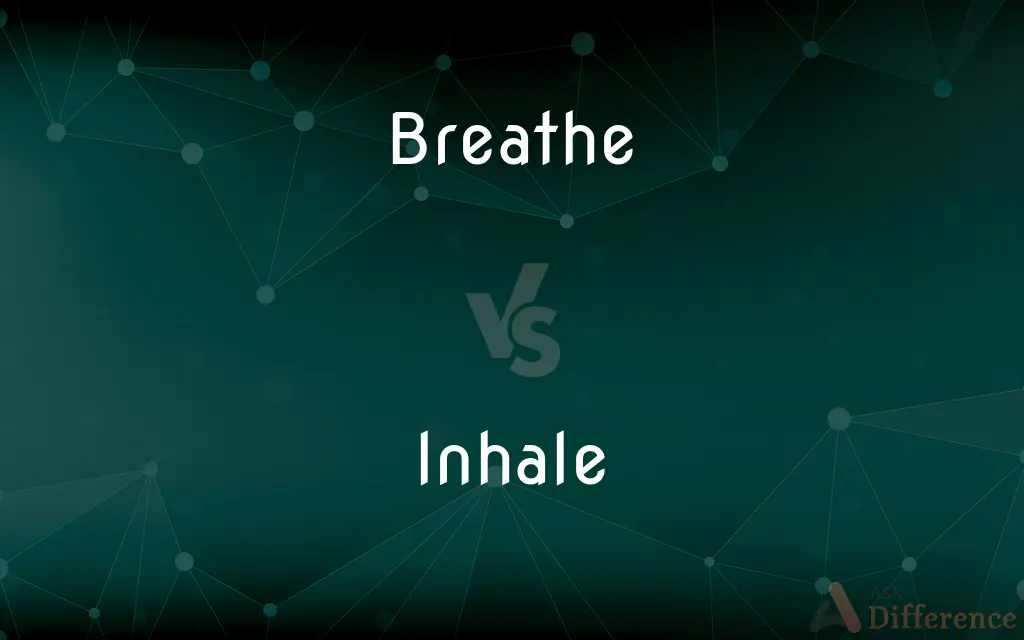Breathe vs. Inhale — What's the Difference?
By Fiza Rafique & Maham Liaqat — Updated on April 20, 2024
Breathe is the process of inhaling and exhaling air to facilitate gas exchange, while inhale specifically refers to drawing air into the lungs.

Difference Between Breathe and Inhale
Table of Contents
ADVERTISEMENT
Key Differences
Breathe is used both in literal physiological contexts and metaphorically to imply relaxation or relief, such as "take a moment to breathe." Inhale, on the other hand, is primarily used in a literal sense and often associated with specific actions like inhaling smoke or a fragrance.
Breathe can refer to the ability or action of respiring which is vital for all aerobic organisms, indicating a continuous, involuntary action. Inhale suggests a voluntary, often forceful act of pulling air into the lungs, such as when smelling a flower or taking a deep breath.
Breathe is often used in expressions like "breathe new life into" or "breathe easily," which suggest influencing or experiencing relief or revitalization. Inhale does not commonly appear in such idiomatic expressions and is more straightforward in its usage.
Breathe can apply to a broader set of rhythmic actions or sounds, such as the wind breathing through the trees, which personifies and broadens its usage beyond the clinical or biological. Inhale, while essential to breathing, is rarely used metaphorically and maintains a direct connection to its physical function.
Comparison Chart
Definition
To take air into the lungs and then expel it, vital for gas exchange
To draw air or other substances into the lungs
ADVERTISEMENT
Usage Contexts
General respiration, metaphorical (relief, life), environmental (wind)
Specific action within the breathing process, clinical or deliberate inhalation
Voluntariness
Can be both involuntary (automatic) or voluntary
Primarily voluntary
Expressions
"Breathe easily," "breathe life into"
Less common in idiomatic usage
Associated Actions
Includes inhaling and exhaling
Involves only inhaling
Compare with Definitions
Breathe
To perform the process of inhalation and exhalation.
We breathe more heavily during exercise.
Inhale
To draw smoke, vapor, or air into the lungs.
She inhaled the aroma of freshly brewed coffee.
Breathe
To live or exist.
The forest breathes with the sounds of wildlife.
Inhale
To inspire or fill with.
The artist inhaled the tranquil surroundings for inspiration.
Breathe
To emit or give off.
The flowers breathed a delicate fragrance.
Inhale
To take in by or as if by breathing.
The audience inhaled the spectacular views.
Breathe
To recover breath.
He paused to breathe after the steep climb.
Inhale
To draw breath into the lungs.
He inhaled deeply before diving.
Breathe
To allow (something) to rest.
The coach suggested they breathe the players before the final quarter.
Inhale
To absorb or consume greedily.
He inhaled his dinner after fasting all day.
Breathe
Take air into the lungs and then expel it, especially as a regular physiological process
He breathed out heavily
Breathe in through your nose
She was breathing deeply
We are polluting the air we breathe
Inhale
To draw (air or smoke, for example) into the lungs by breathing; inspire.
Breathe
To inhale and exhale air using the lungs
Use a snorkel to breathe while swimming.
Inhale
(Informal) To consume rapidly or eagerly; devour
Inhaled lunch and then rushed off to the meeting.
Breathe
To inhale air or another gas
Breathe in slowly.
Inhale
To breathe in; inspire.
Breathe
To exhale air or another gas
I breathed on the window and fogged it up.
Inhale
To draw smoke into the lungs; puff.
Breathe
To exchange gases as part of respiration or photosynthesis
Fish breathe with their gills. Stomata allow leaves to breathe.
Inhale
(intransitive) To draw air into the lungs, through the nose or mouth by action of the diaphragm.
Breathe
To use air in combustion
Leave space so the fire can breathe.
Replace the air filter so the engine can breathe.
Inhale
(transitive) To draw air or any form of gas (either in a pure form, or mixed with small particles in form of aerosols/smoke -sometimes stemming from a medicament) into the lungs, through the nose or mouth by action of the diaphragm.
Breathe
To be alive; live
A nicer person has never breathed.
Inhale
To eat very quickly.
Breathe
To pause to rest or regain breath
Give me a moment to breathe.
Inhale
An inhalation.
Breathe
To move or blow gently
A soft wind breathes through the pines.
Inhale
To breathe or draw into the lungs; to inspire; as, to inhale air; - opposed to exhale.
Martin was walking forth to inhale the fresh breeze of the evening.
Breathe
To allow air to pass through
A natural fabric that breathes.
Inhale
Draw deep into the lungs in by breathing;
Clinton smoked marijuana but never inhaled
Breathe
To be exhaled or emanated, as a fragrance.
Inhale
Draw in (air);
Inhale deeply
Inhale the fresh mountain air
The patient has trouble inspiring
The lung cancer patient cannot inspire air very well
Breathe
To be manifested or suggested, as an idea or feeling
A sense of hope breathes from these poems.
Breathe
To reach fullness of flavor and aroma through exposure to air. Used chiefly of wine.
Breathe
To inhale and exhale (air or a gas such as oxygen) during respiration.
Breathe
To inhale (an aroma, for example)
Breathe the lush scent of lilacs.
Breathe
To exhale or blow out
The dragon breathed fire on the village.
Breathe
To take in or exchange (air or gases)
Plants breathe carbon dioxide.
Breathe
To impart or instill
An artist who knows how to breathe life into a portrait.
Breathe
To utter, especially quietly
Don't breathe a word of this.
Breathe
To make apparent or manifest; suggest
Their manner breathed self-satisfaction.
Breathe
To allow (a person or animal) to rest or regain breath.
Breathe
(Linguistics) To utter with a voiceless exhalation of air.
Breathe
To draw in (air) for combustion.
Breathe
(intransitive) To draw air into (inhale), and expel air from (exhale), the lungs in order to extract oxygen and excrete waste gases.
Breathe
(intransitive) To take in needed gases and expel waste gases in a similar way.
Fish have gills so they can breathe underwater.
Breathe
(transitive) To inhale (a gas) to sustain life.
While life as we know it depends on oxygen, scientists have speculated that alien life forms might breathe chlorine or methane.
Breathe
To live.
I will not allow it, as long as I still breathe.
Breathe
(transitive) To draw something into the lungs.
Try not to breathe too much smoke.
Breathe
(intransitive) To expel air from the lungs, exhale.
If you breathe on a mirror, it will fog up.
Breathe
(transitive) To exhale or expel (something) in the manner of breath.
The flowers breathed a heady perfume.
Breathe
(transitive) To give an impression of, to exude.
The decor positively breathes classical elegance.
Breathe
(transitive) To whisper quietly.
He breathed the words into her ear, but she understood them all.
Breathe
To pass like breath; noiselessly or gently; to emanate; to blow gently.
The wind breathes through the trees.
Breathe
To inspire (scripture).
Breathe
(intransitive) To exchange gases with the environment.
Garments made of certain new materials breathe well and keep the skin relatively dry during exercise.
Breathe
To rest; to stop and catch one's breath.
Breathe
(transitive) To stop, to give a horse an opportunity to catch its breath.
At higher altitudes you need to breathe your horse more often.
Breathe
(transitive) To exercise; to tire by brisk exercise.
Breathe
To passionately devote much of one's life to (an activity, etc.).
Do you like hiking?
Are you kidding? I breathe hiking.
Breathe
To respire; to inhale and exhale air; hence;, to live.
Breathes there a man with soul so deadWho never to himself hath said,This is my own, my native land!
Breathe
To take breath; to rest from action.
Well! breathe awhile, and then to it again!
Breathe
To pass like breath; noiselessly or gently; to exhale; to emanate; to blow gently.
The air breathes upon us here most sweetly.
There breathes a living fragrance from the shore.
Breathe
To inhale and exhale in the process of respiration; to respire.
To view the light of heaven, and breathe the vital air.
Breathe
To inject by breathing; to infuse; - with into.
Able to breathe life into a stone.
And the Lord God formed man of the dust of the ground, and breathed into his nostrils the breath of life.
Breathe
To emit or utter by the breath; to utter softly; to whisper; as, to breathe a vow.
He softly breathed thy name.
Or let the church, our mother, breathe her curse,A mother's curse, on her revolting son.
Breathe
To exhale; to emit, as breath; as, the flowers breathe odors or perfumes.
Breathe
To express; to manifest; to give forth.
Others articles breathe the same severe spirit.
Breathe
To act upon by the breath; to cause to sound by breathing.
Breathe
To promote free respiration in; to exercise.
And every man should beat thee. I think thou wast created for men to breathe themselves upon thee.
Breathe
To suffer to take breath, or recover the natural breathing; to rest; as, to breathe a horse.
A moment breathed his panting steed.
Breathe
To put out of breath; to exhaust.
Mr. Tulkinghorn arrives in his turret room, a little breathed by the journey up.
Breathe
To utter without vocality, as the nonvocal consonants.
The same sound may be pronounces either breathed, voiced, or whispered.
Breathed elements, being already voiceless, remain unchanged [in whispering].
Breathe
Draw air into, and expel out of, the lungs;
I can breathe better when the air is clean
The patient is respiring
Breathe
Be alive;
Every creature that breathes
Breathe
Impart as if by breathing;
He breathed new life into the old house
Breathe
Allow the passage of air through;
Our new synthetic fabric breathes and is perfect for summer wear
Breathe
Utter or tell;
Not breathe a word
Breathe
Manifest or evince;
She breathes the Christian spirit
Breathe
Take a short break from one's activities in order to relax
Breathe
Reach full flavor by absorbing air and being let to stand after having been uncorked;
This rare Bordeaux must be allowed to breathe for at least 2 hours
Breathe
Expel (gases or odors)
Common Curiosities
Can you use 'inhale' to describe the process of breathing?
Inhale can describe part of the breathing process, specifically the action of drawing air into the lungs.
Can both terms be used metaphorically?
Breathe is more commonly used metaphorically to imply life, energy, or a pause for relief, whereas inhale is rarely used metaphorically.
How do the terms apply to medical settings?
In medical contexts, breathe is used to discuss respiratory health broadly, while inhale is often related to specific actions like using an inhaler.
Are breathe and inhale interchangeable?
No, they are not interchangeable as inhale is just one component of the broader process described by breathe.
Is inhaling always voluntary?
Inhaling can be both voluntary and involuntary, but it is often highlighted in contexts where deliberate action is taken, such as inhaling deeply.
How does 'breathe' relate to relaxation techniques?
Breathing techniques often focus on deliberate inhaling and exhaling to promote relaxation and stress reduction.
What is the primary difference between breathe and inhale?
Breathe refers to the overall process of taking in and expelling air, whereas inhale specifically means to draw air into the lungs.
Can animals 'inhale' in the same way humans do?
Most animals inhale oxygen for respiratory processes similar to humans, though the mechanics can vary significantly among different species.
What does it mean to 'breathe a sigh of relief'?
It means to express a feeling of relief through a notable exhalation, emphasizing the emotional release associated with breathing.
Can objects other than living beings 'breathe'?
Yes, in metaphorical or poetic usage, non-living objects like forests or cities can be described as 'breathing' to indicate a sense of life or activity.
What activities specifically involve 'inhaling'?
Activities like smoking, sniffing, or using inhalation therapies specifically involve the act of inhaling.
What does it mean to 'breathe underwater'?
To breathe underwater typically involves using special equipment like scuba gear, as humans cannot naturally inhale oxygen from water.
What is a common medical device associated with inhaling?
Inhalers are common medical devices associated with inhaling, used to deliver medication directly to the lungs.
How does the environment affect how we breathe or inhale?
Environmental factors like air quality can affect breathing patterns and the effectiveness of inhalation, especially in polluted or allergen-rich areas.
Share Your Discovery

Previous Comparison
Amber vs. Ember
Next Comparison
Competence vs. PerformanceAuthor Spotlight
Written by
Fiza RafiqueFiza Rafique is a skilled content writer at AskDifference.com, where she meticulously refines and enhances written pieces. Drawing from her vast editorial expertise, Fiza ensures clarity, accuracy, and precision in every article. Passionate about language, she continually seeks to elevate the quality of content for readers worldwide.
Co-written by
Maham Liaqat














































